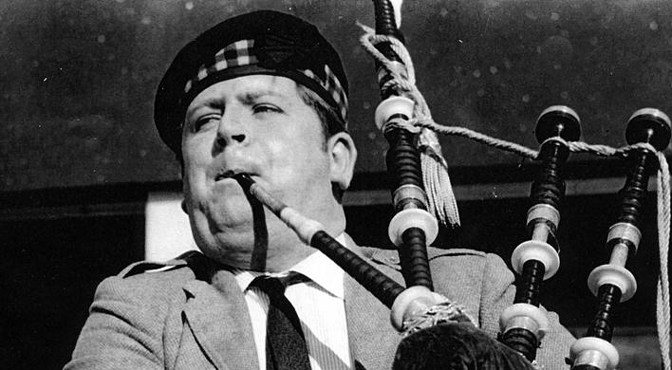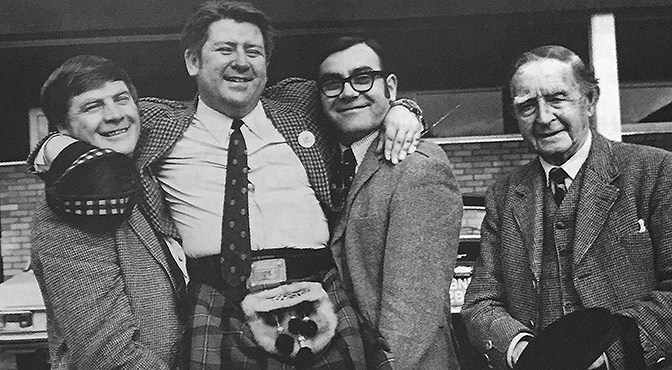Dr. John MacAskill
(1944-2003)
reprinted with permission from the Piping Times, June 2003
There was widespread sadness when the death of Dr. John MacAskill, one of the great characters of the modern day piping fraternity, was announced last month. Dr. John died after a long illness bravely borne. His funeral took place in Fort William where he had practiced medicine for more than 25 years until his recent retirement . A large crowd assembled in the town’s Duncansburgh Parish Church for the funeral service. John’s pupils Leslie Hutt and John Don MacKenzie gave a fine rendering of part of the Lament for Patrick Og. Internment took place on Dr. John’s home island of Berneray in the sound of Harris. John Napier MacAskill was born on 4th February, 1944, in Glasgow. He was encouraged by his father, also a piper, to take up the instrument. He enrolled as a pupil at the College of Piping on 8th January, 1957, aged 13 years and six months receiving instruction from Seumas MacNeill from 1957 to 1962. Later he studied Piobaireachd with Donald MacLeod, Angus MacPherson and Andrew MacNeil. He was an active and respected member of the College of Piping Board.
As an insight into John MacAskill the man and piper we can do no better than to run this piece written by Seumas MacNeill, his first teacher, shortly after John’s Gold Medal triumph in 1972. His tune was Lady Anapool’s Lament coincidentally one of the set tunes for this year.
Seumas MacNeill wrote: “The great thing about the piping scene is the number of colourful characters that go to make it up. In addition, however, to the average run-of-the-mill brilliant types, there occasionally appears – once or twice in every decade – one who is larger than life, destined to become a legend in an early part of his lifetime. Such is this year’s Northern Meeting Gold Medallist Dr. John N. MacAskill. When the winner was announced, men of discernment looked for ways to escape, men of experience prepared to batten down the hatches, and men of neither are still wondering what happened. But everybody was delighted that to the roll of the immortals added a name which will shine and sparkle with the best.

It was sixteen years ago that young John started on his eventful piping career. Before that, at the age of ten, he had been taken along by his father to the competitions in Glasgow, but so far as learning to play was concerned, the boy did not fancy it. Eventually, however, the music got to him and he decided to have a shot at being a piper. So, on the 8th January, 1957, at the age of thirteen and a half, John presented himself at the College of Piping and asked to be taken on. Those who consider that this is a bit late for a boy to start learning, especially in Glasgow, with all the opportunities available, should consider this. John knew absolutely nothing when he arrived, but twelve days later he won third prize in a chanter competition! The tune was (naturally) Scots Wha Hae. The judge was Hector MacFadyen. John’s progress was phenomenal. With two lessons per week he got through Tutor 1 in three months completely and perfectly. By the time he went to the College summer school at Dunvegan in July he was playing competition tunes. He rapidly overhauled everybody of his age group, although some of them had been playing for four or five years before he started. The policy in the College of course has always been to ‘hasten slowly’, taking the view that when God made time he made plenty of it, and that it is more important to get all the basic work correct than to rush ahead learning lots of new things. This made John’s progress all the more surprising. He, in fact, caused the College to take a fresh policy on what is the best age for beginners.
John MacAskill had, of course, tremendous encouragement at home. His father and his two uncles were pipers. Although living in Glasgow he had been brought up in Berneray, Harris, and is a native Gaelic speaker. All his holidays were spent on his remote Hebridean island, where the music of the Gael sings from every blade grass. Small wonder that the song and the great feeling are in his playing today. His competition career followed the usual pattern of a boy of talent in Glasgow. He played in the S. P. A. amateur contests, winning the Chisholm Cup, the Farquhar Macrae trophy, the Cameron Cup and, on one famous occasion, all the College of Piping trophies in the same evening. At North Uist games one summer he took a first prize, and this encouraged him to turn professional. At Glenfinnan in 1962 he was placed in the march event, against stiff opposition. The following year he won again at Glenfinnan and also played at South Uist where, against some of the best players in the country, he won four prizes: first in the jig, second in the march, fourth in Piobaireachd, fifth in strathspey and reel.
All this when barely twenty years old, six and a half years after first touching a practice chanter. The following year, at the Northern Meeting in Inverness, he reached the short leet of the march competition. The hall was crowded to capacity as he tuned the bagpipe carefully. Then, head well back and the concentration full on, he went twice through Pipe-Major John Stewart to tremendous applause and the first prize. By this time young MacAskill was a medical student at Glasgow University (demonstrating that progress in piping and in academic study are not incompatible). His studies did restrict him a bit, however, but they also allowed him a fair amount of free time in the summer. He had always enjoyed summer schools and had attended all the College ones, the one at Staffin in Skye in 1963 as one of the two junior instructors (Dugald Murdoch was the other one).
In 1965 he decided on something more ambitious and went off to New York to help at the Invermark school. When it finished, he and Donald Lindsay set out, with a small car and a tent to see American, coast to coast. This is a saga which needs a long night and a peat fire for the proper telling. The following year he was too busy for competition, but in 1967 he showed again what a great march player he was by winning the Oban event. Then, in 1970, he took the strathspey and reel at Inverness. Now, not having competed anywhere in the interim, he wins the Inverness Gold Medal. As John says of himself, “I just compete every two years – and then I’m lethal”. Already he has the three qualities of the complete piper – he can play, he can teach, he can compose. As a composer he is looked on by everyone in Scotland as the best of his generation and one of the best in the country. His reel Lexie MacAskill (composed for his mother) has been a hit tune for two years and has obviously joined the ranks of the classics.
But it may well be as a teacher that John MacAskill will make his biggest impact on piping. In 1970, when I needed assistance for the growing classes at the Thousand Islands, Ontario, and the Coeur d’Alene, Idaho schools, my first choice along with Bob Hardie was John MacAskill, and the success of this team is now a household word. In 1971 they repeated these courses. This past summer when the College decided to open its own school in California, John’s reputation ensured its immediate and lasting success.
What does the future hold for Dr. John MacAskill? Certainly we will have a continuing flow of new tunes from him, because he just cannot help composing. So far as teaching is concerned, his medical work is so demanding that, unfortunately, Scotland will get little benefit of his tremendous talent, although he has agreed to continue to teach summer schools in the United States. And it is certainly to be hoped that he will continue to compete, even if it’s only every two years. Captain D. R. MacLennan sums up his playing quite simply: ‘The best fingers in Scotland’. It would be a great pity if they were not heard in action regularly.”
